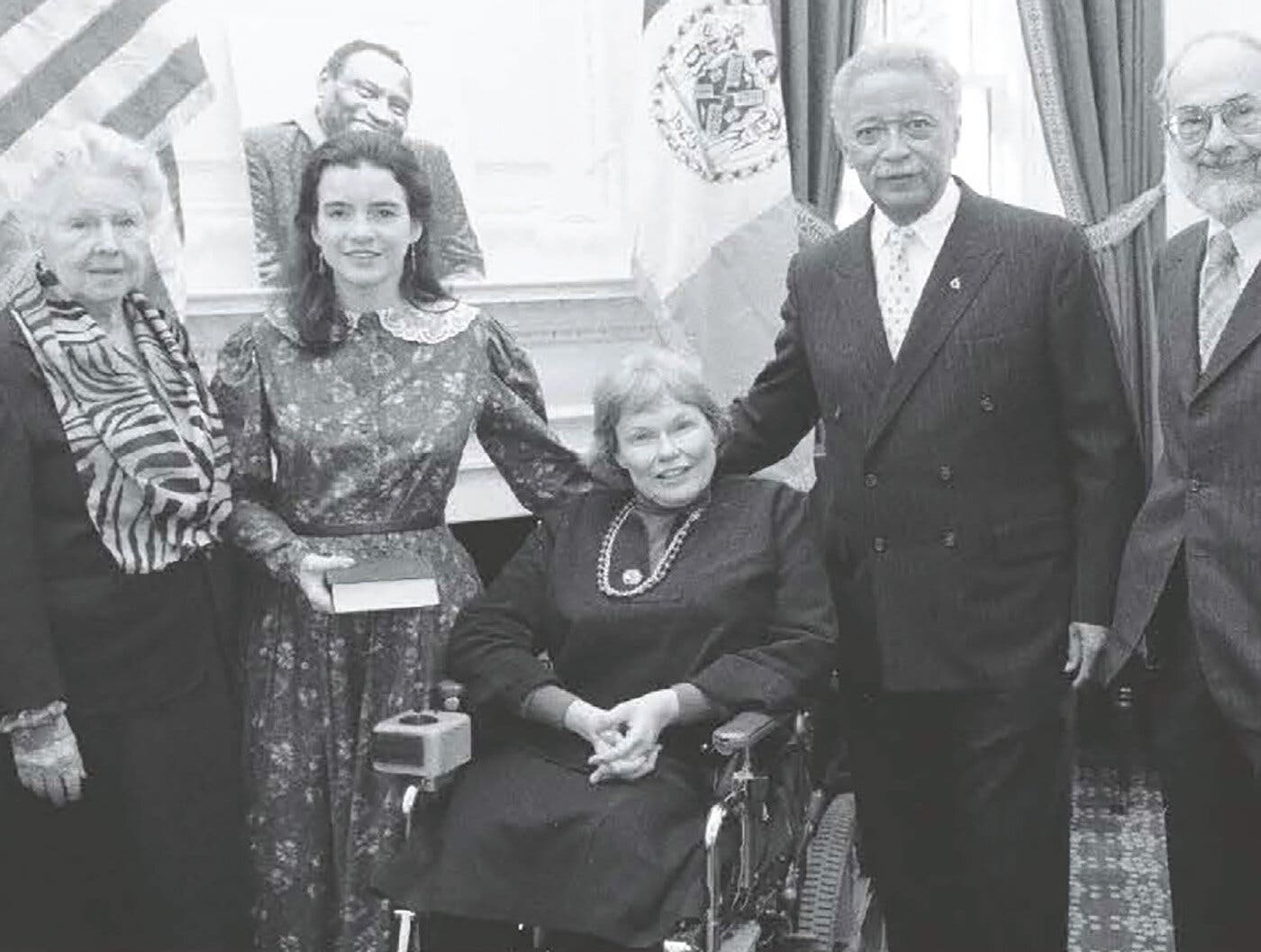In honor of JDAIM, highlighting a powerful civil rights advocate for people with disabilities who recently passed away

Anne Emerman, seated, in 1990 after being sworn in as director of the New York City Mayor’s Office for People With Disabilities under Mayor David N. Dinkins, second from right. Also with her, from left, were her mother, Mae Bobson; her daughter, Amy Emerman; and her husband. Credit via New York City Mayor’s Office for People With Disabilities
By Stacey Spencer • JFCS Inclusion Program Manager
We recently lost a great disabilities activist – chances are you have never heard of her, but she changed the world for so many people. In November 2021, Anne Emerman passed away in her hometown of New York City at 84 years old.
Anne was born on Feb. 24 (coincidently my birthdate as well) in 1937. When she was 7 years old, she contracted Polio – allegedly while playing in the water on the shores of the Jersey shore – and thereafter used a wheelchair for the rest of her life. Even though she spent most of her childhood and adolescence in and out of hospitals with multiple surgeries, it did not slow her down a bit. She attended college independently and received a degree in political science from Hunter College, followed by a master’s degree in social work in 1964 from Columbia University. She worked as a psychiatric social worker at Bellevue Hospital.

In 1970, Anne married research chemist Sidney Emerman, who she happened to meet on a street corner when Sidney offered to help her cross the street. Two years later, they started a family of their own when Anne gave birth to a daughter. Anne’s passion with disability activism began in 1970, when she demanded that polling booths be accessible. It helped her community and politicians realize that people with disabilities should not be seen as invisible and should be included with others who were entitled to vote in elections.
When asked why if she couldn’t get to her polling place, she couldn’t just vote by absentee ballot, she replied, “I am not absent, I am not on vacation, I am part of my community,” according to The New York Times. New York City spent $10 million to make polling places accessible to people with disabilities as a result of her activism.
One of Anne’s most extensive achievements that paved the way and helped level the playing fields for people who used wheelchairs was her influential and successful lobbying in 1987 for all new and renovated buildings in New York City to be wheelchair accessible, which still holds true to this day. After that, she was appointed by Mayor David N. Dinkins as the director of The Mayor’s Office for People with Disabilities.
“She was fierce,” Victor Calise, the current commissioner of that office. (The New York Times) “She set a standard of advocacy in city government that is still going on today,” he added. “She knew her stuff, and you weren’t going to mess with her.”
Even Mother Teresa couldn’t mess with Anne. Mother Teresa wanted to convert tenements into a homeless shelter, but did not want to pay to install an elevator for people who could not use the stairs. Mother Teresa said she would rather carry people up the stairs who could not make it up themselves. Anne would not hear of it and said, “You don’t carry people up and down in our society. That’s not acceptable here.” (The New York Times) Eventually, after much debate, Mother Teresa pulled the plug on the project after Anne never backed down from her convictions.
In addition to sharing the same birthdate, Anne and I also share a passion for helping communities set a standard of advocacy to help make sure that all people with disabilities be included in everyday life. All of us who work to promote inclusion in our communities owe Anne a debt of gratitude for being a trailblazer and a powerful advocate of civil rights for people with disabilities. After all, as inclusion advocate Deej Savarese said, “Being included is everyone’s right—it shouldn’t be a lottery.”
During the month of February, JFCS and Jewish communities around the world observe and commemorate Jewish Disability Awareness, Acceptance and Inclusion Month (JDAIM). The mission of JDAIM is to unite Jewish communities worldwide to raise awareness and champion the rights of all Jews to be accepted and included in all aspects of Jewish life. Click here for a list of JDAIM events and activities happening locally.
